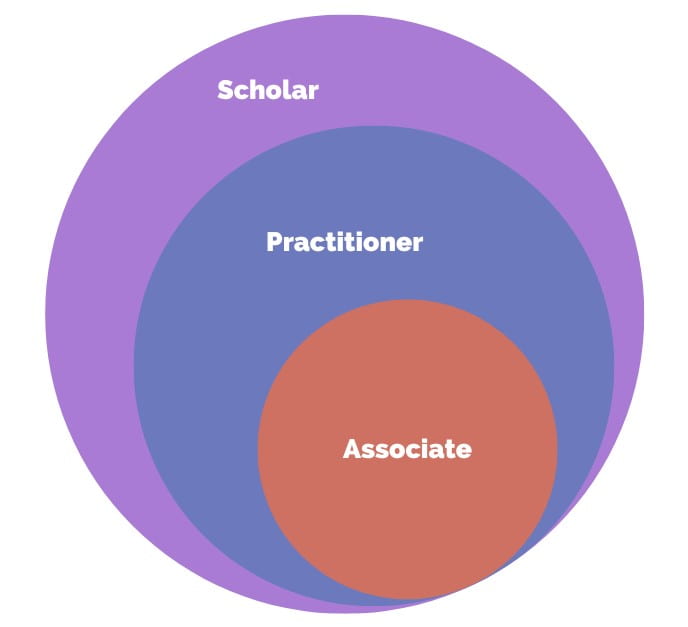CIRTL@UCI
The Center for the Integration of Research, Teaching, and Learning (CIRTL) seeks to enhance undergraduate education through the development of future faculty who are committed to implementing and advancing evidence-based practices for diverse learners. The CIRTL Network is a nation-wide network of universities all sharing this common aim.
CIRTL@UCI is dedicated to supporting UCI graduate students and postdocs in pursuing evidence-based teaching and research. UCI’s CIRTL programming is open to graduate students and postdocs from any discipline. Interested graduate students and postdocs can earn certificates that document their mastery of CIRTL core ideas. The three CIRTL certificate levels, in order of increasing program requirements, are: Associate, Practitioner, and Scholar. The UCI workshops and programs that fulfill the requirements of each level are provided in the table below.
Regardless of your level of interest, all graduate students and postdocs at UCI have access to the wealth of online resources, webinars, and courses offered on the main CIRTL website. We recommend that you sign up for the CIRTL newsletter as well!

All levels of certification cover the following core ideas of CIRTL:
- Learning communities: Supports the formation of communities for graduate students, postdocs, and faculty members to engage in conversation about current advances in pedagogy.
- Teaching-as-research: Advocates for the deliberate, systematic, and reflective use of research methods by instructors to develop and implement teaching practices that advance the learning experiences and outcomes of students and teachers.
- See here for a testimonial from former UCI graduate student Daniel Bergman about presenting his Teaching-As-Research project at a disciplinary conference.
- Learning-through-diversity: Draws on the rich array of experiences, backgrounds, and skills among teachers and learners to enhance learning of all.
To earn an Associate Certificate, you must complete programming that covers the core ideas of CIRTL mentioned above. More specifically, you must:
- Participate in a learning community of at least 8 hours. Programs satisfying this requirement are denoted with * below.
- Develop familiarity with teaching-as-research (TAR). Programs satisfying this requirement are denoted with † below.
- Gain an understanding of the importance of learning-through-diversity. Programs satisfying this requirement are denoted with ‡ below.
Example pathways to earning the certificate include:
- Complete a Pedagogy course at UCI. Examples include: University Studies 390X*†‡, ENGR 290*†‡, ANTHRO 289*†‡, EDUC 226*†‡.
- Become a Pedagogical Fellow*†‡
- Complete the Self-paced Certificate in Teaching Excellence course on Canvas (including the optional “Teaching as Research” module)†‡ AND become part of a learning community. Example learning communities include:
- Summer Graduate Fellows*‡
- Summer Teaching Apprenticeship Program*‡
- Course Design Certificate Program (offered in the Winter and Summer) *‡
- Participate in CIRTL network programs (see here or below for upcoming CIRTL programs and events; which core ideas are covered will vary by the program).
To earn a Practitioner Certificate, you must:
- Fulfill all requirements of the Associate Certificate
- Plan and implement a Teaching-As-Research project. The project should:
- Engage existing literature on the subject.
- Propose a realistic, achievable, measurable, and student-centered intervention and analyze the outcomes to draw evidence-based conclusions.
- Show how Evidence-Based Teaching, Learning Communities, and Learning-through-Diversity are involved in accomplishing your learning goals.
To earn a Scholar Certificate, you must:
- Fulfill all requirements of the Practitioner Certificate
- Contribute to the CIRTL community by making your Teaching-As-Research project public and accessible. Pathways to doing so include:
- Publishing a paper based on your research in a peer-reviewed paper
- Presenting your research at a disciplinary or teaching conference
- Publishing about your study in DTEI’s FLIP’D Blog.
For questions about whether various programs/workshops fulfill the CIRTL certificate requirements, contact Charli Arhart (carhart@uci.edu).
July 2024 |
||||||
|---|---|---|---|---|---|---|
| Mon | Tue | Wed | Thu | Fri | Sat | Sun |
|
1
|
2
|
3
|
4
|
5
|
6
|
7
|
|
8
|
9
|
10
|
11
|
12
|
13
|
14
|
|
15
|
16
|
17
|
18
|
19
|
20
|
21
|
|
22
|
23
|
24
|
25
|
26
|
27
|
28
|
|
29
|
30
|
31
|
||||
CIRTL@UCI is led by the Office of the Vice Provost of Teaching and Learning and the Division of Teaching Excellence and Innovation.
